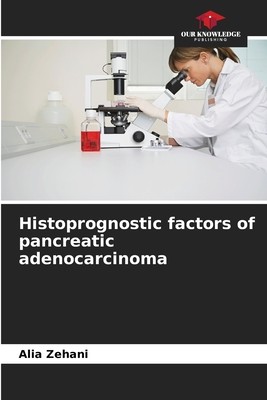
- We will send in 10–14 business days.
- Author: Alia Zehani
- Publisher: Our Knowledge Publishing
- ISBN-10: 6205921154
- ISBN-13: 9786205921159
- Format: 15.2 x 22.9 x 0.5 cm, softcover
- Language: English
- SAVE -10% with code: EXTRA
Reviews
Description
Pancreatic ductal adenocarcinoma (PDA) has a poor prognosis. Identification of the factors that condition its aggressiveness would be crucial. The aim of the study was to determine the histoprognostic factors of resectable PCA and to evaluate the interest of the Epithelial-Mesenchymal Transition (EMT) study. This is a descriptive study of 36 cases of PCA. EMT was assessed by tumor budding and immunohistochemical expression of vimentin and CD44. Conventional PCA was the primary histologic type (78%). The 5-year survival was 5.6%. Age >= 70 years and expression >= 5% of vimentin influenced survival in univariate analysis. Size >= 4 cm, presence of tumor remnant, and high-grade budding were independent factors for poor prognosis. Tumor budding was the only independent factor influencing disease-free survival. It was associated with vimentin expression. EMT is a progressive phenomenon of PCA responsible for its aggressiveness and resistance to chemotherapy. Recognition of the mechanisms that regulate this phenomenon offers hope for targeted therapies.
EXTRA 10 % discount with code: EXTRA
The promotion ends in 16d.13:23:13
The discount code is valid when purchasing from 10 €. Discounts do not stack.
- Author: Alia Zehani
- Publisher: Our Knowledge Publishing
- ISBN-10: 6205921154
- ISBN-13: 9786205921159
- Format: 15.2 x 22.9 x 0.5 cm, softcover
- Language: English English
Pancreatic ductal adenocarcinoma (PDA) has a poor prognosis. Identification of the factors that condition its aggressiveness would be crucial. The aim of the study was to determine the histoprognostic factors of resectable PCA and to evaluate the interest of the Epithelial-Mesenchymal Transition (EMT) study. This is a descriptive study of 36 cases of PCA. EMT was assessed by tumor budding and immunohistochemical expression of vimentin and CD44. Conventional PCA was the primary histologic type (78%). The 5-year survival was 5.6%. Age >= 70 years and expression >= 5% of vimentin influenced survival in univariate analysis. Size >= 4 cm, presence of tumor remnant, and high-grade budding were independent factors for poor prognosis. Tumor budding was the only independent factor influencing disease-free survival. It was associated with vimentin expression. EMT is a progressive phenomenon of PCA responsible for its aggressiveness and resistance to chemotherapy. Recognition of the mechanisms that regulate this phenomenon offers hope for targeted therapies.


Reviews